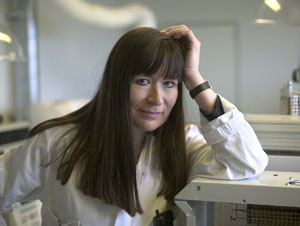
Bente Klarlund Pedersen
Professor, M.D.,
Dr.Med.Sci.
Professor of Internal
Medicine
1983 - present,
appointments at various medical departments at Rigshospitalet at the
Since 1991 senior
registrar and leader of the research laboratory at the department of Infectious
Diseases, Rigshospitalet.
Since 1997 senior
physician at the department of infectious diseases, Rigshospitalet.
BKP is the leader of a
research group, which counts more than 20 PhD-students, post-docs and technical
personnel (www.bkpgroup.dk)
|
1993 – 1997 |
President for The
International Society of Exercise and Immunology, ISEI |
|
1997 – |
Board member of ISEI |
|
1997 – 2001 |
President for the
Danish Society of Infectious Diseases
|
|
1999 – 2002 |
Editor at The Journal
of Danish Medical Association |
|
2003 – |
President of the
Research Council of Rigshospital, University |
|
2003 – |
Vicepresident of The
National Network of Health Promoting Hospitals in |
|
2003- |
Leader of The Muscle
Cluster at The Faculty of Health |
Publications: > 300
publications – see www.bkpgroup.dk
Invited as “key-note
speaker” or “invited speaker” in more than 100 international meetings.
Exercise, Metabolism and Cytokines
Bente Klarlund Pedersen
The Department of
Infectious Diseases and The
For most of the last
century, researchers have searched for a muscle-contraction-induced factor,
which mediates some of the exercise effects in other tissues such as the liver
and the adipose tissue. It has been called the “work stimulus”, the “work
factor” or the “exercise factor”.
In our search for such a
factor, we found a cytokine, IL-6, which is produced by contracting muscles and
released into the blood. We have demonstrated that IL-6 has many biological
roles such as: 1) Activation/inhibition of metabolic genes; 2) Induction of
lipolysis 3) Inhibition of insulin resistance and 4) Suppression of
TNF-production.The IL-6 gene is rapidly activated during exercise and the
activation of this gene is further enhanced when muscle glycogen content is
low. In addition, carbohydrate supplementation during exercise has been shown
to inhibit the release of IL-6 from contracting muscle. Thus, it is suggested
that muscle-derived IL-6 fulfils the criteria of an exercise factor and that
such classes of cytokines should be named “myokines”.
Pedersen BK &
Hoffman- Goetz, L. (2000) Physiological Reviews 80, 1055-1081.
Pedersen BK, Steensberg
A, Schjerling P (2001). Journal of Physiology (
Febbraio MA & Pedersen BK (2002)
FASEB J 16. 11:1335-47
Pedersen BK et al (2003) J Muscle Res Cell Motil
24(2-3):113-9.
Febbraio MA, Hiscock N, Sacchetti M,
Fischer CP, Pedersen BK. Diabetes. 2004 Jul;53(7):1643-8.